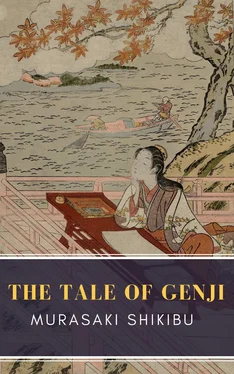When the young prince reached the age of three, the resources of the treasury and the stewards’ offices were exhausted to make the ceremonial bestowing of trousers as elaborate as that for the eldest son. Once more there was malicious talk; but the prince himself, as he grew up, was so superior of mien and disposition that few could find it in themselves to dislike him. Among the more discriminating, indeed, were some who marveled that such a paragon had been born into this world.
In the summer the boy’s mother, feeling vaguely unwell, asked that she be allowed to go home. The emperor would not hear of it. Since they were by now used to these indispositions, he begged her to stay and see what course her health would take. It was steadily worse, and then, suddenly, everyone could see that she was failing. Her mother came pleading that he let her go home. At length he agreed.
Fearing that even now she might be the victim of a gratuitous insult, she chose to go off without ceremony, leaving the boy behind. Everything must have an end, and the emperor could no longer detain her. It saddened him inexpressibly that he was not even permitted to see her off. A lady of great charm and beauty, she was sadly emaciated. She was sunk in melancholy thoughts, but when she tried to put them into words her voice was almost inaudible. The emperor was quite beside himself, his mind a confusion of things that had been and things that were to come. He wept and vowed undying love, over and over again. The lady was unable to reply. She seemed listless and drained of strength, as if she scarcely knew what was happening. Wanting somehow to help, the emperor ordered that she be given the honor of a hand-drawn carriage. He returned to her apartments and still could not bring himself to the final parting.
“We vowed that we would go together down the road we all must go. You must not leave me behind.”
She looked sadly up at him. “If I had suspected that it would be so —” She was gasping for breath.
“I leave you, to go the road we all must go.
The road I would choose, if only I could, is the other.”
It was evident that she would have liked to say more; but she was so weak that it had been a struggle to say even this much.
The emperor was wondering again if he might not keep her with him and have her with him to the end.
But a message came from her mother, asking that she hurry. “We have obtained the agreement of eminent ascetics to conduct the necessary services, and I fear that they are to begin this evening.”
So, in desolation, he let her go. He passed a sleepless night.
He sent off a messenger and was beside himself with impatience and apprehension even before there had been time for the man to reach the lady’s house and return. The man arrived to find the house echoing with laments. She had died at shortly past midnight. He returned sadly to the palace. The emperor closed himself up in his private apartments.
He would have liked at least to keep the boy with him, but no precedent could be found for having him away from his mother’s house through the mourning. The boy looked in bewilderment at the weeping courtiers, at his father too, the tears streaming over his face. The death of a parent is sad under any circumstances, and this one was indescribably sad.
But there must be an end to weeping, and orders were given for the funeral. If only she could rise to the heavens with the smoke from the pyre, said the mother between her sobs. She rode in the hearse with several attendants, and what must her feelings have been when they reached Mount Otaki? It was there that the services were conducted with the utmost solemnity and dignity.
She looked down at the body. “With her before me, I cannot persuade myself that she is dead. At the sight of her ashes I can perhaps accept what has happened.”
The words were rational enough, but she was so distraught that she seemed about to fall from the carriage. The women had known that it would be so and did what they could for her.
A messenger came from the palace with the news that the lady had been raised to the Third Rank, and presently a nunciary arrived to read the official order. For the emperor, the regret was scarcely bearable that he had not had the courage of his resolve to appoint her an imperial consort, and he wished to make amends by promoting her one rank. There were many who resented even this favor. Others, however, of a more sensitive nature, saw more than ever what a dear lady she had been, simple and gentle and difficult to find fault with. It was because she had been excessively favored by the emperor that she had been the victim of such malice. The grand ladies were now reminded of how sympathetic and unassuming she had been. It was for just such an occasion, they remarked to one another, that the phrase “how well one knows” had been invented.
The days went dully by. The emperor was careful to send offerings for the weekly memorial services. His grief was unabated and he spent his nights in tears, refusing to summon his other ladies. His serving women were plunged into dew-drenched autumn.
There was one lady, however, who refused to be placated. “How ridiculous,” said the lady of the Kokiden pavilion, mother of his eldest son, “that the infatuation should continue even now.”
The emperor’s thoughts were on his youngest son even when he was with his eldest. He sent off intelligent nurses and serving women to the house of the boy’s grandmother, where he was still in residence, and made constant inquiry after him.
The autumn tempests blew and suddenly the evenings were chilly. Lost in his grief, the emperor sent off a note to the grandmother. His messenger was a woman of middle rank called Myōbu, whose father was a guards officer. It was on a beautiful moonlit night that he dispatched her, a night that brought memories. On such nights he and the dead lady had played the koto for each other. Her koto had somehow had overtones lacking in other instruments, and when she would interrupt the music to speak, the words too carried echoes of their own. Her face, her manner — they seemed to cling to him, but with “no more substance than the lucent dream.”
Myōbu reached the grandmother’s house. Her carriage was drawn through the gate — and what a lonely place it was! The old lady had of course lived in widowed retirement, but, not wishing to distress her only daughter, she had managed to keep the place in repair. Now all was plunged into darkness. The weeds grew ever higher and the autumn winds tore threateningly at the garden. Only the rays of the moon managed to make their way through the tangles.
The carriage was pulled up and Myōbu alighted.
The grandmother was at first unable to speak. “It has been a trial for me to go on living, and now to have one such as you come through the dews of this wild garden — I cannot tell you how much it shames me.”
“A lady who visited your house the other day told us that she had to see with her own eyes before she could really understand your loneliness and sorrow. I am not at all a sensitive person, and yet I am unable to control these tears.”
After a pause she delivered a message from the emperor. “He has said that for a time it all seemed as if he were wandering in a nightmare, and then when his agitation subsided he came to see that the nightmare would not end. If only he had a companion in his grief, he thought — and it occurred to him that you, my lady, might be persuaded to come unobtrusively to court. He cannot bear to think of the child languishing in this house of tears, and hopes that you will come quickly and bring him with you. He was more than once interrupted by sobs as he spoke, and It was apparent to all of us that he feared having us think him inexcusably weak. I came away without hearing him to the end.” “I cannot see for tears,” said the old lady. “Let these sublime words bring me light.”
Читать дальше












